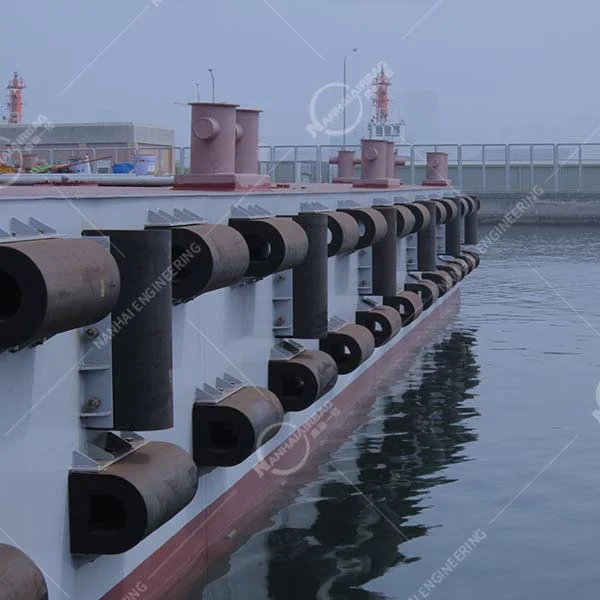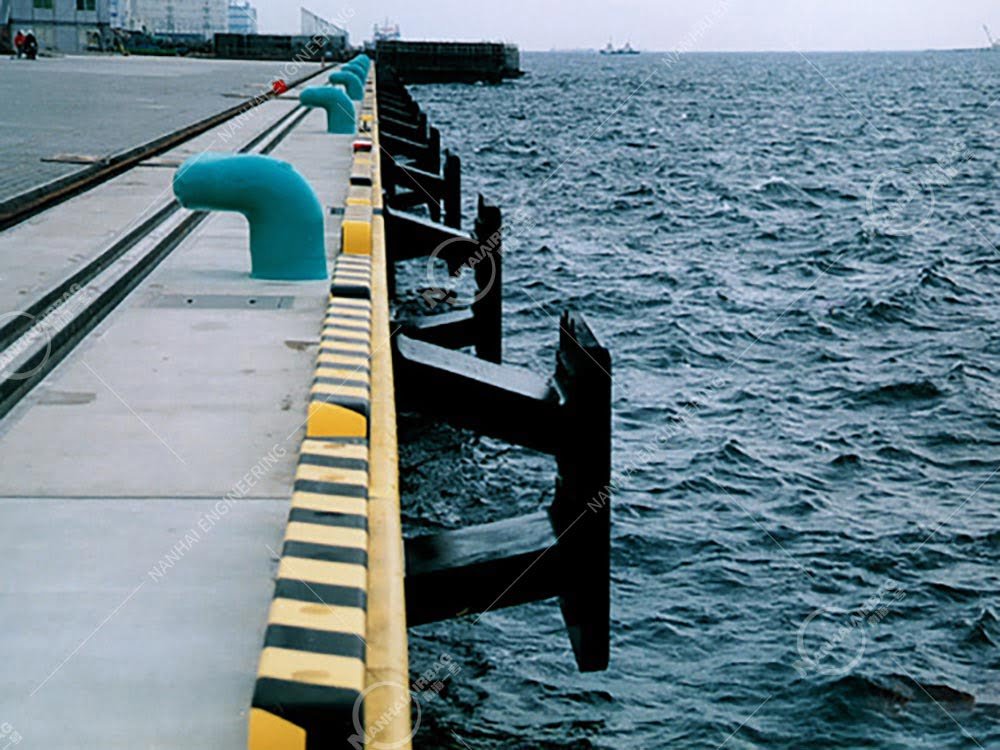Pneumatic Rubber Fenders: The Dock & Ship Savior You Didn’t Know You Needed
16/10/2025Square Rubber Fenders: The Dock Protector You Didn’t Know You Were Missing (Until It’s Too Late)
23/10/2025

Ever walked into a marina and stared at those thick, rubbery blocks bolted to the docks—kinda like giant, squishy bricks? You probably thought, “Oh, those are just for looks.”Wrong. Those are fixed rubber fenders, and they’re the unsung heroes of every busy waterfront. Last year, my buddy Jake—owner of a tiny marina in Washington—almost lost his business after a storm slammed a 50-foot yacht into his old, cracked wooden docks. The damage? $220k in repairs… plus months of empty slips. Then he installed fixed rubber fenders. Six months later? Zero damage, happy boaters, and his bank account finally stopped bleeding. That’s the power of these things—and why you need to listen up.
So What Exactly Are Fixed Rubber Fenders?
Let’s keep it simple: Fixed rubber fenders are permanent, heavy-duty marine fenders designed to shield docks, piers, boats, and waterfront infrastructure from brutal impacts. Unlike pneumatic fenders (those air-filled tubes you can drag around), fixed fenders are bolted or embeddedinto docks—they’re built to stay put forever. Made from high-density natural rubber (often reinforced with polyester or steel), they flex when hit, absorbing shock instead of transferring it to whatever’s on the other side (your boat, your dock, your wallet). Think of them like the “airbags” for your waterfront—always ready to take the hit so nothing else does.
Why This Isn’t Just “Nice to Have”—It’s a Crisis You Can’t Afford to Ignore
Let’s cut the fluff: Our waterways are busier, ships are bigger, and storms are angrier. The average cargo ship today is 100 meters longer than it was 20 years ago. Climate change is pumping more moisture into hurricanes, making them more destructive. And boaters? They’re not getting any gentler on docks. If you’re running a marina, owning a private dock, or even just mooring your boat in a public slip—you’re sitting on a liability bomb withoutfixed rubber fenders.Consider this:
- •A single hit from a 40-foot boat can split wooden pilings or shatter concrete docks—costing tens of thousands to repair.
- •Unprotected docks lead to scratched, dented, or even flooded boats… and angry boaters who’ll either leave or sue.
- •Ports like Miami have already switched to fixed rubber fenders after Hurricane Irma nearly collapsed a pier (a hit that would’ve shut down the port for months if not for the fenders).
Fixed rubber fenders aren’t a “dock upgrade”—they’re disaster insurance. And right now, the cost of nothaving them is way higher than the cost of installing them.
Wait—Why Fixed Over Pneumatic or Marine Airbags? The Numbers Don’t Lie
You might be wondering: “What about pneumatic fenders? Or those marine airbags I see on ship launches?”Let’s settle this once and for all:
- •vs. Pneumatic Fenders: Pneumatic are great for temporaryspots (like a construction site) or small boats. But fixed fenders? Permanent. Reliable. Built for high-traffic areas where you need 24/7 protection. Plus, they handle massiveimpacts—think cruise ships, not just fishing boats.
- •vs. Marine Airbags: Marine airbags are for one thing: launching or lifting ships. They’re not designed to absorb repeated hits from docking boats. Fixed rubber fenders? That’s their onlyjob—and they do it 10x better.
- •vs. Wooden/Concrete Fenders: Oh, please. Wooden fenders rot. Concrete cracks. Fixed rubber fenders flex with impact—so they don’t break. And they look way better (no splinters or ugly gray cracks).
And here’s the kicker: They save you money. A 2024 study found marinas with fixed rubber fenders spend 60% less on dock repairs annually. One California marina saved $45k in its first year—enough to cover the cost of 20 fenders andupgrade their restrooms.
Real Talk: A Marina Manager’s “I Wish I’d Done This Sooner” Story
We talked to Lisa, who runs a 20-slip marina in Oregon. “Before fixed fenders, we were replacing docks every year,” she said. “Boats would hit the pilings, crack the wood, and we’d have to shell out $10k per section. Then a storm took out three docks—we almost closed. We invested in fixed rubber fenders, and now? Two years later, zero dock damage. Boaters even chooseour marina because they know their boat is safe. Best decision ever.”Lisa’s not alone. Every marina owner we’ve spoken to says the same thing: Fixed fenders turn their biggest headache into their biggest selling point.
People Also Ask: Your Fixed Rubber Fender Questions—Answered
We get these queries daily—let’s clear them up so you can stop Googling:
Q: How long do fixed rubber fenders last?
A: With basic maintenance (rinse saltwater monthly, check bolts twice a year, inspect for cracks), they last 10–15 years. Some brands offer 20-year warranties—talk about peace of mind.
Q: Are fixed rubber fenders better than movable pneumatic ones?
A: For permanent docks or high-traffic areas? 100% yes. Pneumatic are for temporary setups; fixed are for “set it and forget it” protection.
Q: What’s the difference between rubber fenders and marine airbags?
A: Rubber fenders (fixed/pneumatic) protectdocks/boats from impacts. Marine airbags launch/liftships—they’re not for repeated hit absorption.
Q: Do fixed fenders work for big ships like cruise liners?
A: Absolutely. Ports use extra-large fixed fenders (up to 4m tall) to handle cargo ships and cruise liners. Just match the fender size to your vessel’s weight and speed.
Q: How do I maintain fixed rubber fenders?
A: Easy—rinse with fresh water once a month (salt eats rubber!), check bolts for rust, and patch small cracks immediately (big cracks turn into catastrophic failures).
Final Thought: Stop Letting Impacts Ruin Your Waterfront
Fixed rubber fenders aren’t just another marine product—they’re the backbone of a safe, profitable dock. Whether you’re a marina owner, a boat slips renter, or a private dock builder, these fenders will save you money, time, and the headache of dealing with damage.Ready to upgrade? Start by measuring your dock and figuring out which size fenders you need (bigger boats = bigger fenders—duh). Then reach out to a reputable manufacturer—they’ll help you pick the right ones (and even install them if you’re lazy like me).Your dock will thank you. Your wallet will thank you. And most importantly? Your boaters will thank you—by coming back every single season.Keywords: fixed rubber fenders, marine fenders, rubber fenders, marine airbags, dock protection, marina safety
